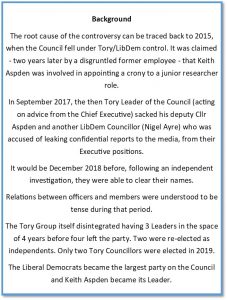Its over a year since the York Councils last Chief Executive – Mary Weastell – retired. It was thought to be the end of what had been an awkward relationship.
An auditor’s report from Mazers, issued yesterday, criticises the process used to approve the terms of the early retirement.
We said over a year ago that details of settlements (anonymised to protect the privacy of individuals) should be published.
That still does not happen in York.
What happened after the May 2019 elections is the subject to varied interpretations.
However, very soon after the poll Mary Weastall went absent on sick leave.
It appears that negotiations about her future then extended over a 12 month period.
There were (unsubstantiated) allegations of bullying while the Council said that it wanted to reduce ongoing costs by doing away with the post of Chief Executive.
In turn this attracted what is known as a public interest report from the Councils external auditors. In essence taxpayers had claimed that an estimated £400,000 (actual £377,115) pay off given to the departing Chief Executive was excessive. Most of the money went on pension contributions.
The auditors are critical of Keith Aspden for not declaring a personal interest at the (private) meeting which determined the payment to be made to the former Chief Executive. They confirm that this was not a pecuniary interest as Councillors have access to public liability insurance cover.
(Mazers fall short of their own standards when quoting from a 2017, supposedly independent investigators report, which subsequently turned out to be far from “independent”. It was considered at a public meeting – at Cllr Aspden’s request – on 3rd January 2019. They also omit to mention that the bogus investigation cost taxpayers over £100,000 and Cllr Aspden £20,000 himself)
The auditors confirm that the former Chief Executive was kept on full pay throughout her sick leave absence. Her contract provided only for 6 months on full pay followed by 6 months on half pay. The difference amounts to £18,165.
The auditors also say that of the £377,115 “exit package” only £286,452 was statutory. The Council had a choice about whether to pay the remaining £90,663 which was labelled as “redundancy” and “ex gratia”.
The auditors recommend,
- The Council should adopt and apply appropriate standards for business case preparation in relation to exit and pension discretions to improve information supporting decisions.
- Decision notes should be maintained that document the factors that explain the case for the use of public funds under the scheme of delegation such as where payments exceed contractual entitlements.
- The Council should review the design of its governance policies and procedures to manage conflicts of interest (including self-interest threats). This should include updating the Council’s constitution and scheme of delegation.
- The Council should ensure all Members fully understand the requirements of the Code of Conduct in relation to declaration of interests.
- The Council should review its policies and procedures to reflect Government guidance in the use of non-disclosure agreements.
The Council has said that it accepts the recommendations and will act to changes its procedures.
We will see.
